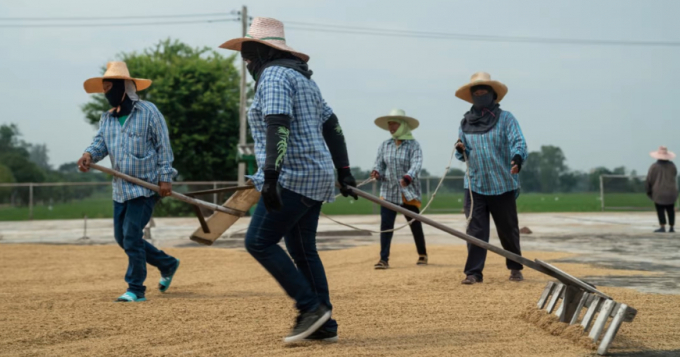November 26, 2025 | 02:47 GMT +7
November 26, 2025 | 02:47 GMT +7
Hotline: 0913.378.918
November 26, 2025 | 02:47 GMT +7
Hotline: 0913.378.918

Rice workers in Thailand, which is set to join forces with Vietnam to control production. Photo: Bloomberg
Such a move will benefit millions of rice farmers in the two countries who have struggled with rising costs while prices of the grain have remained subdued, Prayuth’s spokesman Thanakorn Wangboonkongchana said in a statement. Vietnam’s Deputy Agriculture and Rural Development Minister Tran Thanh Nam met with Thai officials Thursday to discuss a framework for cooperation.
The threat to boost rice prices from the two major exporters comes amid growing food protectionism and runaway inflation. There’s concern that India may restrict rice exports after similar moves in wheat and sugar, upending global food markets already roiled by Russia’s invasion of Ukraine.
While Thailand is not contemplating any curbs on shipments, it’s keen to milk the opportunity as import-dependent countries seek to lock in grain supplies.
Rice has been the one staple grain that is helping to keep the world food crisis from getting worse.
Unlike wheat and corn, which have seen prices skyrocket as the war in Ukraine disrupts supplies from a major breadbasket, rice prices have been stable subdued due to ample production and existing stockpiles.
Rice prices will remain subdued because of abundant supplies with the world set to harvest record crops until 2023, said Jeremy Zwinger, chief executive officer of The Rice Trader, and a researcher.
While there has been some shift in demand to rice as animal feed, it wasn’t enough to send prices soaring Zwinger said, adding supplies may ease once farmers start using less fertiliser because of high prices.
Thailand’s rice exports are benefiting from a rebound in global demand as the pandemic eases and a slump in its currency to a five-year low makes its supplies more competitive.
Shipments may climb as high as 8 million tons this year, up from 6.1 million tons last year, Commerce Minister Jurin Laksanawisit told reporters on Friday.
Thai sugar and chickens exports are also set to benefit from export curbs placed by India and Malaysia respectively, according to industry officials.
The Southeast Asian nation “has excess supply of most foods we produce and we remain the kitchen of the world”, Arada Fuangtong, deputy director general of the Department of International Trade Promotion said.
Rice may be India’s next food protectionism target after it restricted wheat and sugar exports, analysts say, a move that could have a devastating impact on global food security as it’s an important staple.
India’s curbs on wheat and sugar exports sent shock waves through global markets as it marked an escalation in food protectionism that is seen countries choke off flows of locally-grown supplies to the world. A similar move on rice by the No. 1 exporter at a time when crops like wheat and corn are soaring would threaten to plunge millions more into hunger and boost inflation risks.
“The government has already imposed restrictions on wheat exports; it’s a matter of time when restrictions on rice exports might be considered,” said Radhika Piplani, an economist at Yes Bank Ltd. The challenge will be to see if such curbs will lower food prices and within what time frame, she added.
The situation of rice stocks was discussed at the meeting of an interministerial committee that tracks prices of essential commodities, according to a person familiar with the matter. But the committee decided there’s no need to restrict rice shipments for now because India has huge inventories, said the person, who asked not to be identified as the information is confidential.
A spokesperson who represents both the trade and food ministries did not immediately respond to an email seeking comment. The food secretary did not immediately respond to a request for comment.
(SCMP)

(VAN) Brazil's COP30 presidency pushed through a compromise climate deal on Saturday that would boost finance for poor nations coping with global warming but that omitted any mention of the fossil fuels driving it.

(VAN) Poultry farmers in the UK have been warned that they could face one of the worst winters yet for bird flu.

(VAN) Prices of main-crop paddy have risen sharply, with jasmine rice hitting 16,100 baht per tonne — the highest level in years.

(VAN) In Brazil, FAO unveiled a series of reports and initiatives showing how sustainable agrifood systems are a solution to the climate crisis.

(VAN) With names like neodymium and dysprosium, rare-earth elements sound exotic — and their perceived scarcity has only added to the mystique.

(VAN) In a new study published in Trends in Biotechnology, researchers used a gene-editing technology called CRISPR to increase a fungus's production efficiency and cut its production-related environmental impact by as much as 61%- all without adding any foreign DNA.

(VAN) A top official in Beijing’s Cop delegation says China is committed to clean energy – but US’s absence is a problem.